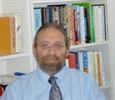 You may be surprised to learn that this weekend, February 11-13, is the sixth annual Evolution Weekend. While not found on any liturgical calendars, it affords congregations of all faiths a focused opportunity to consider the compatibility of religion and science.
You may be surprised to learn that this weekend, February 11-13, is the sixth annual Evolution Weekend. While not found on any liturgical calendars, it affords congregations of all faiths a focused opportunity to consider the compatibility of religion and science.
Meet the Founder
Michael Zimmerman (pictured at right) is the founder and director of The Clergy Letter Project , which is the international organization of more than 14,000 religious leaders and scientists that sponsors the weekend. Zimmerman currently serves as a professor of biology at Butler University. Previously he has served as Dean of the College of Liberal Arts and Sciences at Butler and as Dean of the College of Letters and Science at the University of Wisconsin–Oshkosh.
About the Weekend
Evolution Weekend began as a single day event in 2006. The first year 467 congregations representing every state in the United States participated. The following year the event became international and in 2008 it expanded from a day to a weekend. The highest participation rate to date was 1049 congregations from 15 countries in 2009, which was the 200th anniversary of the birth of Charles Darwin and the 150th anniversary of the publication of his seminal work On the Origin of Species.
Explaining this year’s event in the Huffington Post, Zimmerman writes:
For the sixth time, hundreds of religious congregations on six continents will participate in an event designed to demonstrate that the most exciting scientific findings pose no threat to deeply held religious belief. Indeed, the leaders and members of these congregations recognize that as science teaches us more about how the natural world functions, their faith becomes stronger rather than weaker. And, although there are some who find it difficult to accept, participants are fully comfortable embracing the basic principles of science without having to forsake the most important aspects of their faith. . . .
Promoters of Evolution Weekend want to create a space to explore the relationship between religion and science. They want to elevate the “dialogue” on the subject that has devolved into sound bites with shouts claiming that people must choose between religion and science passing as “discourse.” They also want to demonstrate that it is possible to truly discuss complex issues, issues that have divided many, with sincerity and respect. Finally, they want to prove to all who are willing to take notice, that those fundamentalists who claim to be speaking on behalf of religion are not speaking for thousands of clergy and the religions they represent.
So What?
Growing up, what were you taught about the respective roles of science and religion? How have your views changed over time? Try explaining your current view in a few sentences or less. What sources exert significant influence in your current understanding? Does your congregation participate in Evolution Weekend or offer other times of focused study and dialogue about this topic?